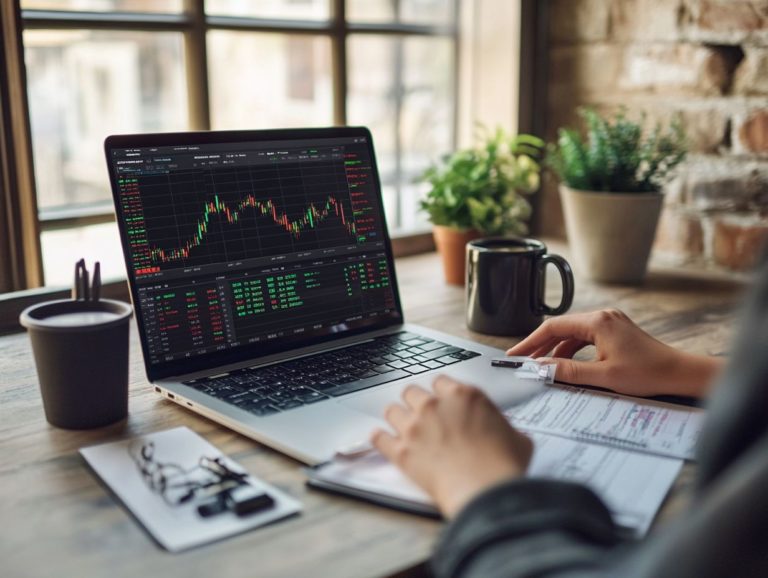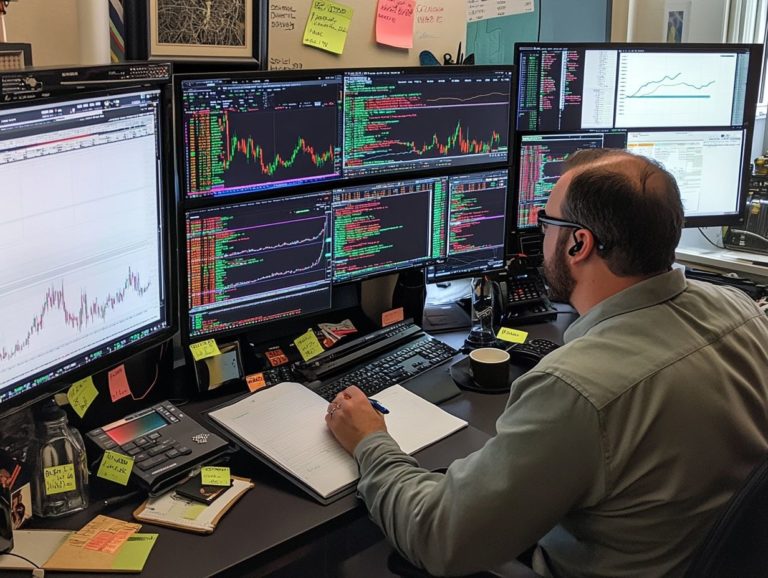5 Ways to Manage Trading Anxiety
Trading can be an exhilarating yet nerve-wracking venture. It often leads to anxiety that clouds your judgment and affects your decision-making. Take action now to transform your trading experience and boost your confidence!
This article delves into five effective strategies designed to help you manage trading anxiety and regain control over your trading experience. From understanding the root causes of your stress to developing a structured trading plan and practicing mindfulness, you ll find practical steps to cultivate a more balanced mindset.
Explore the significance of community support and self-care practices as you navigate the emotional ups and downs of the market. Join in as we unpack these essential tools for a calmer, more focused trading journey.
Contents
- Key Takeaways:
- 1. Understand the Root Cause of Your Anxiety
- 2. Develop a Trading Plan
- 3. Practice Mindfulness and Relaxation Techniques
- 4. Seek Support and Guidance
- 5. Take Breaks and Practice Self-Care
- What Are the Common Triggers for Trading Anxiety?
- How Can a Trading Plan Help with Managing Anxiety?
- What Are Some Effective Mindfulness Techniques for Traders?
- How Can Joining a Trading Community Help with Anxiety?
- What Are Some Self-Care Practices That Can Help with Trading Anxiety?
- What Are the Long-Term Effects of Ignoring Trading Anxiety?
- How Can Seeking Professional Help Be Beneficial for Trading Anxiety?
- What Are Some Common Misconceptions About Trading Anxiety?
- How Can a Positive Mindset Help with Managing Trading Anxiety?
- What Are Some Strategies for Staying Calm During Market Volatility?
- Frequently Asked Questions
Key Takeaways:

- Understand the root cause of your trading anxiety to effectively manage it.
- Developing a well-structured trading plan can alleviate anxiety and provide a sense of control.
- Practice mindfulness and relaxation techniques to stay calm and focused during trading.
1. Understand the Root Cause of Your Anxiety
Understanding the root cause of your trading anxiety is essential for cultivating an effective trading mindset. By identifying the emotional triggers that affect your performance, you can enhance your approach.
Many traders face anxiety due to factors like market volatility, fear of losses, or the pressure to excel. Acknowledging these elements can lead to a more structured trading system, and implementing ways to improve your trading performance can further enhance your approach.
Insights from experts such as Michael Thomas and Patricia Buczko emphasize the value of emotional intelligence and methods to change your thoughts and feelings in alleviating these feelings. Reflecting on your experiences in the financial markets, particularly during those tense trading sessions in Thailand, can offer you clarity and direction.
Grasping these psychological aspects can revolutionize your approach to trading, enabling you to develop effective coping strategies. For instance, consider the case of a trader who initially battled crippling anxiety during sudden market shifts. By employing methods to change their thoughts and feelings like reframing negative thoughts and practicing mindfulness this trader reshaped their emotional responses.
This transformation illustrates how recognizing personal triggers, such as past experiences or unrealistic expectations, can pave the way for better trading habits and improved overall performance. As you navigate the complexities of trading, nurturing your emotional intelligence prepares you for these challenges and gives you the power to make informed decisions with greater confidence.
2. Develop a Trading Plan
A solid trading plan can be your best ally in conquering trading anxiety! It encapsulates a clear strategy and a robust risk management framework, enabling you to navigate the complexities of the financial markets with confidence.
Incorporating critical elements like understanding market signals, determining optimal position sizes, and consistently maintaining a trading journal can significantly enhance your performance. Recognizing market trends and signals provides clarity in your decision-making process, while calculated position sizing ensures that you manage risk effectively.
Documenting your trades in a journal allows for reflective learning, which is invaluable for refining your strategies. This structured approach alleviates unnecessary stress and fosters disciplined trading habits, contributing to more favorable outcomes in the long run.
Share your experiences and strategies for managing trading anxiety with others in the community to foster support and understanding! You can also explore five ways to stay motivated as a trader for additional insights.
3. Practice Mindfulness and Relaxation Techniques
Incorporating mindfulness and relaxation techniques into your trading routine can greatly assist in managing stress and developing the ability to handle emotions. This approach helps you stay focused on the process instead of getting swept away by market fluctuations.
Even dedicating just a few minutes each day to practices like meditation can help you cultivate a sense of calm and clarity, which is vital in high-pressure environments. Breathing exercises, such as taking a moment for deep breaths, can ground your thoughts and alleviate anxiety.
Visualization methods can also serve as powerful tools. Picturing successful trading scenarios can enhance your confidence and decision-making skills. To further improve emotional regulation, consider setting specific times for these activities perhaps right before the market opens or during a mid-day break.
Integrating mindfulness every day can elevate your trading performance tremendously!
4. Seek Support and Guidance
Seeking support and guidance from a trading community can be incredibly beneficial in overcoming trading anxiety. By sharing experiences and strategies, you foster emotional intelligence and build a network of encouragement.
Participating in forums and mentorship programs connects you with others who understand the unique challenges of the market. These interactions often spark fresh perspectives that inspire innovative trading strategies, enhancing your skill set.
Community events provide excellent networking opportunities, allowing you to share valuable insights and resources. Engaging with your peers alleviates the loneliness that can accompany tough trading periods and fosters a sense of camaraderie and shared purpose. This collaborative approach encourages personal growth and builds resilience, making your trading journey feel less daunting.
5. Take Breaks and Practice Self-Care

In the fast-paced world of trading, it s essential to take regular breaks and prioritize self-care. This approach is crucial for managing stress and reducing trading anxiety, allowing you to maintain a healthy balance between your work and personal well-being.
Along with those well-deserved breaks, engaging in physical exercise can serve as a powerful antidote to the mental strain that often accompanies trading. Activities like jogging or yoga boost your endorphins and provide a refreshing distraction from market fluctuations.
Pursuing hobbies outside of trading enhances your creativity and gives you a new perspective, keeping your enthusiasm for investments alive.
Setting firm boundaries around your trading hours is equally vital. By designating specific times for trading and stepping away afterward, you can effectively minimize burnout. Regular mental breaks encourage you to recharge and refocus, leading to clearer decision-making and improved overall performance.
What Are the Common Triggers for Trading Anxiety?
Common triggers for trading anxiety often arise from various market conditions and personal psychological factors, such as the fear of losses, uncertainty in trading decisions, and the pressure to consistently achieve profits.
You may notice these triggers becoming more pronounced during sudden market volatility or unsettling financial news that catches you off guard, making you feel overwhelmed and vulnerable. Emotional intelligence is crucial in these moments, helping you maintain perspective and manage your emotional responses. By cultivating self-awareness, you can recognize when anxiety begins to creep in, allowing you to make informed, rational decisions instead of reacting impulsively.
This thoughtful approach fosters resilient trading habits, transforming potential setbacks into opportunities for growth and nurturing a healthier relationship with the markets.
What mindfulness technique will you try today to enhance your trading journey?
How Can a Trading Plan Help with Managing Anxiety?
A well-structured trading plan serves as your secret weapon for managing anxiety. It empowers you to make informed decisions based on a clear system.
By outlining specific goals, you can focus on achieving clear results instead of being overwhelmed by market chaos.
This includes essential risk management measures, like setting stop-loss orders, a tool to limit losses on a trade, which help minimize losses during volatile times.
Successful traders often create response mechanisms for various market signals. For example, they enter a trade only when certain conditions are met. Renowned traders like Ed Seykota credit their emotional stability to carefully crafted trading plans, maintaining discipline even in high-pressure situations.
What Are Some Effective Mindfulness Techniques for Traders?
Effective mindfulness techniques for traders include practices such as meditation, deep breathing exercises, and visualization, all designed to enhance your emotional resilience and help you manage stress in high-pressure trading environments.
By weaving these methods into your daily routine or just before you enter the market, you can significantly sharpen your focus and elevate your decision-making abilities. For instance, starting with a simple five-minute meditation session can help clear your mind, allowing for improved concentration on market movements.
When tension arises, deep breathing exercises can serve as your anchor, guiding you to regain composure and alleviate anxiety. Visualization techniques prepare your mind for various trading scenarios, fostering a sense of calm and confidence.
These strategies create a more balanced emotional state, empowering you to make well-informed decisions and ultimately enhancing your trading performance.
How Can Joining a Trading Community Help with Anxiety?
Joining a trading community can drastically reduce your anxiety by providing a support network where you can share your experiences, strategies, and emotional challenges. This fosters a sense of belonging and enhances your emotional intelligence.
These communities often create a safe space for you to discuss your fears and uncertainties openly, ultimately leading to greater confidence in your trading decisions. For example, platforms like the Day Trading Academy offer not just educational resources but also mentorship opportunities between seasoned traders and newcomers. Initiatives such as Women in Trading promote shared learning experiences, demonstrating how collective knowledge can truly demystify the trading world.
By cultivating these connections, you ll be better equipped to navigate market fluctuations, knowing you have the support of a network that genuinely understands your journey.
What Are Some Self-Care Practices That Can Help with Trading Anxiety?

Incorporating self-care practices into your daily routine is essential for combating trading anxiety. These practices manage stress and promote overall well-being, which is vital for maintaining a healthy trading mindset.
Engaging in physical activities, such as jogging or yoga, not only improves your physical health but also enhances mental clarity and resilience qualities that are essential during volatile market conditions.
Nutrition plays a crucial role as well; a balanced diet rich in omega-3 fatty acids and antioxidants can significantly boost your cognitive function. Dedicating time to hobbies like painting or reading allows you to take mental breaks, giving you the chance to recharge.
Together, these practices cultivate emotional stability, helping you maintain focus during high-pressure situations and ultimately enhancing your performance in the market. Don t wait to start these practices; they can transform your trading mindset today!
What Are the Long-Term Effects of Ignoring Trading Anxiety?
Ignoring trading anxiety can have serious long-term effects on your mental health and performance. It can lead to poor decision-making and increased losses.
Persistent anxiety can erode your confidence. This makes it difficult to make calculated decisions under pressure.
This psychological strain disrupts your trading strategies. It creates an environment where impulsive and ill-informed choices thrive, further compounding your losses.
Research indicates that nearly 70% of traders experience some anxiety. Those who neglect it often underperform compared to their balanced counterparts.
This emotional turmoil leads to missed opportunities. It can gradually cause you to disconnect from your trading goals.
Recognizing and managing anxiety early is crucial for navigating the market with a clear mind and sound judgment.
How Can Seeking Professional Help Be Beneficial for Trading Anxiety?
Seeking professional help can be a game-changer for managing trading anxiety. Therapists and coaches provide tailored methods to enhance your emotional intelligence and trading performance.
These experts often offer ongoing support through workshops focusing on stress management and mindfulness. Engaging in these resources helps you navigate high-pressure situations.
With the right guidance, you can identify your triggers and develop effective coping mechanisms. This leads to improved decision-making and a more positive trading experience.
Leveraging professional support can significantly boost your confidence and emotional well-being, paving the way for greater success in trading.
What Are Some Common Misconceptions About Trading Anxiety?
Many misconceptions about trading anxiety lead you to underestimate its significance. You might feel that experiencing it is a sign of weakness or that you should suffer in silence.
These beliefs can harm your mental health and trading performance. Acknowledging anxiety as a normal response to high-stakes trading is the first step toward overcoming it.
Research shows that addressing anxiety helps build emotional resilience. This creates a more balanced approach to decision-making.
Many traders find that sharing their experiences and seeking support enhances their stress management. This ultimately sharpens their trading skills.
Recognizing these emotional challenges promotes a healthier mindset. It also encourages a proactive approach to market unpredictability.
How Can a Positive Mindset Help with Managing Trading Anxiety?
Cultivating a positive mindset is crucial for managing trading anxiety. It gives you the power to tackle market challenges with confidence.
A strong, positive outlook equips you to navigate market volatility. It also sharpens your decision-making skills under pressure.
Start each day with affirmations that remind you of your abilities and goals. Setting specific, achievable targets helps keep distractions at bay.
Reframe negative thoughts into constructive lessons. This allows you to turn setbacks into opportunities for growth in your trading journey.
What Are Some Strategies for Staying Calm During Market Volatility?

Utilizing effective strategies to stay calm during market volatility can significantly reduce your trading anxiety. A clear trading strategy and a well-defined system provide a structured approach to navigating uncertainties.
One essential tactic is to set stop-loss orders. These orders manage risk by automatically exiting trades at predetermined price levels, easing the pressure on your decision-making.
Sticking to a defined trading plan ensures your decisions are based on thoughtful analysis rather than emotional impulses.
Incorporating mindfulness techniques, like deep breathing or meditation, can improve your focus and reduce stress. Maintaining your composure amid rapid price changes is crucial.
Preparing for various market scenarios helps you remain adaptable, which supports your emotional stability.
Frequently Asked Questions
What is trading anxiety?
Trading anxiety is the feeling of uneasiness, fear, and stress traders experience when making financial decisions in the market.
How does trading anxiety affect traders?
This anxiety can lead to poor decision-making, hesitation, and even physical symptoms like increased heart rate. It can result in missed opportunities and losses.
What are 5 ways to manage trading anxiety?
1. Follow a well-developed trading plan. This gives you a sense of control and direction.
2. Practice self-care. Engage in exercise, meditation, and ensure you rest adequately to lower stress levels.
3. Monitor your thoughts. Identify negative thoughts and replace them with positive, realistic ones.
4. Use risk management techniques. Implementing stop-loss orders can help alleviate anxiety about potential losses and is part of overcoming emotional trading with strategies.
5. Seek support. Talk to a mentor, join a trading community, or seek professional help for valuable guidance.
Why is it important to manage trading anxiety?
Managing trading anxiety is crucial because it impacts a trader’s decision-making and overall market performance.
Can trading anxiety be completely eliminated?
While some anxiety in trading is normal, it can be managed with the right techniques, such as learning how to keep emotions in check while trading. Complete elimination may be unrealistic, as it is a natural response to risks.
How long does it take to see improvements?
The time to see improvements varies per individual, depending on factors like anxiety severity and the methods used. Consistently implementing effective strategies can reduce anxiety over time.





